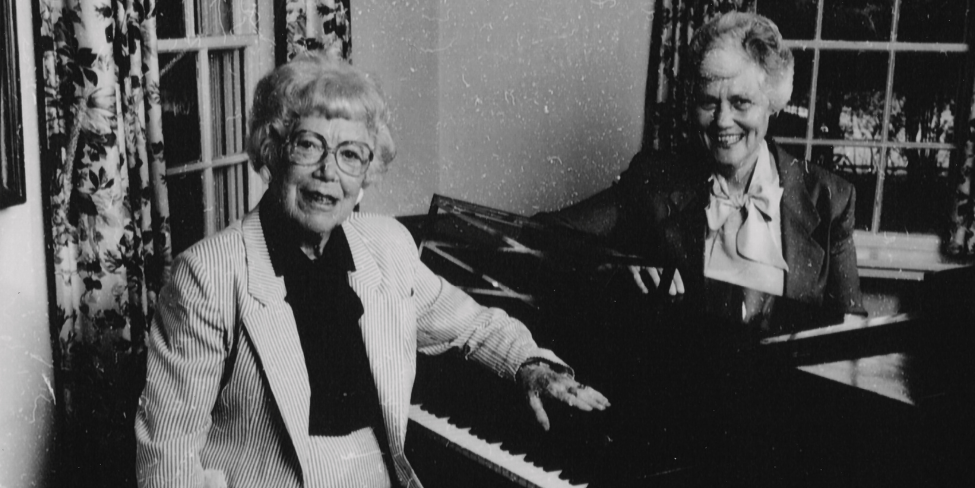
We are pleased to share some of our favorite quotes by Frances Clark, the pioneer pianist and educator for whom the organization is named. To read more of Clark’s writing, you can purchase her book, Questions and Answers, by clicking here.
On the Value of Music
“To understand music is to know an entire range of human expression, and to be able to play it means participating in that communication. As much as writing or mathematics, music represents a special form of literacy with its own repertoire of emotional and intellectual content. Perhaps as in no other discipline, to study music is to study a truly universal language, one that illuminates our culture as it connects us with other people and other times. It’s no wonder, then, that the understanding of music and the ability to play it have long been regarded as marks of a well-educated individual, as much as music itself is the mark of civilization. It’s in this context — the pursuit of the best possible education — that a sequential, balanced, comprehensive program of music study belongs.”1
On the Survival of Music
“All that’s new today is that change is occurring faster, the list of activities that compete for a student’s time is longer and family life as we once knew it has changed. But music is tough stuff. Piano students have survived all these changes; piano study has survived all this competition. Piano teachers must be a tough breed, too, for they have survived as well.”2
On the Philosophy of Teaching
“A philosophy of piano pedagogy is the piano teacher’s most valuable possession. And because it is so valuable, we need to take time out at regular intervals to reevaluate it. Occasionally we also need to put it into words. Then, in the privacy of our own studios, we need to ask ourselves, ‘Is that what I demonstrated, what I used, what I lived when I taught today?’ And we need to ask whether we are working with a student who is preparing to play a concerto with an orchestra or with a young beginner, with a student whose musicianship exceeds his technique or one whose technique outruns his musical understanding. With each of these students, and with all the others, do we really live what we say we believe about piano teaching?”3
On Being a Successful Teacher
“If they continue not only to play music they studied with you but to explore other music; if they are part of the musical life of their communities; if they attend concerts; if, when they have children of their own, they encourage them to study piano, not because it’s the thing to do, but because they want their children to have the same musical experience they remember with such pleasure — then I think we can assume, without any reasonable doubt, that you have been a successful teacher.”4
On Teaching Piano Pedagogy
“As piano pedagogy teachers we need to be able to verbalize our philosophy and we need to be able to demonstrate it with beginners, with intermediate students, and with students who are advanced… But being a good model is only half the pedagogy teacher’s job. The other part is equally important. Can we sit back and watch objectively when the student-teacher takes over? Can we give ourselves completely to the observation, refraining from interrupting when things go less smoothly than we could make them go? And in our conference after the observed lesson, can we avoid judgmental evaluation, using instead questions that lead the student-teacher to his own awareness of the strengths and weaknesses of his teaching?”5
OTHER RESOURCES YOU MIGHT ENJOY
- PIANO MAGAZINE: A Philosophy of Piano Pedagogy by Frances Clark
- VIDEO: Conversations, Part 1 by Frances Clark
- VIDEO: Perspectives on Teaching by Frances Clark
- COURSES: Foundational Piano Pedagogy (Self-Guided)
- PIANO MAGAZINE: Spring 2023: Questions and Answers by Charlene Ryan
- Use our search feature to discover more!
- Frances Clark, Questions and Answers: Practical Advice for Piano Teachers (Northfield, IL: The Instrumentalist Company, 1992), 16.
- Frances Clark, Questions and Answers: Practical Advice for Piano Teachers (Northfield, IL: The Instrumentalist Company, 1992), 6.
- Frances Clark, “A Philosophy of Piano Pedagogy,” Clavier Companion 5, no. 3 (May 2013), https://pianoinspires.com/article/a-philosophy-of-piano-pedagogy/.
- Frances Clark, Questions and Answers: Practical Advice for Piano Teachers (Northfield, IL: The Instrumentalist Company, 1992), 1.
- Frances Clark, “A Philosophy of Piano Pedagogy, Part 2,” Clavier Companion 5, no. 4 (July 2013), https://pianoinspires.com/article/a-philosophy-of-piano-pedagogy-part-2/.